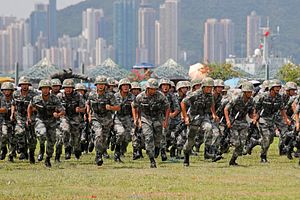Less than a month before the 70th anniversary of Mao Zedong’s establishment of the People’s Republic of China on October 1, millions of men and women in Hong Kong are demanding liberty: Not from a Western imperialist, but from the Chinese Communist Party. The breakdown of Hong Kong’s autonomy is a failure for China, as its current President Xi Jinping has no good options from which to choose.
The United States is right to stand with Hong Kong, and actually has significantly more leverage than most people think in deterring China from cracking down there. Since the 1997 handover by the United Kingdom, as part of the autonomy arrangement hammered out with Beijing, Hong Kong has enjoyed special economic treatment that has made the island-city a haven for capital from the Mainland. That privileged status, as much as anything else, is what has prevented the PRC from clamping down on the protesters to date. It also provides America with an important opening by which to pressure China.
But why does Beijing feel so threatened by Hong Kong’s democracy? The answer can be found in Chinese history. From the Iron Age to the Industrial Revolution, China’s abiding strategic weakness was disunity. In Confucian parlance, the Chinese emperor commanded “all things under heaven,” but in practice dynasties in China ebbed and flowed as territory expanded and contracted along its periphery. Yale historian Kenneth Scott Latourette observed this phenomenon in 1964 when he noted the existence of two Chinas: China proper, spanning from Hebei and Gansu down to Sichuan and Guangdong, and outlying sections of Manchuria and Mongolia to the north and Tibet and modern-day Xinjiang to the west. “The very size of the country,” Latourette observed, “militates against unity.”
By the time Mao Zedong and his comrades secured control of China’s heartland in 1949, the People’s Republic of China was surrounded by civilizations with no interest in the Communist experiment. Subjugating this periphery was a strategic necessity for Mao. Tibet offered a natural buffer zone against India, and Xinjiang united the heartland with Central Asia. Similarly, in the east, Taiwan was China’s gateway to the Pacific and the sine qua non of coastal security.
Mao overcame resistance in Tibet and Xinjiang with military force and “an empty gift of autonomy,” in the words of China scholar Frank Dikötter. The ensuing cultural genocide should have alerted the West, but Britain, the United States, and the free world accepted the same deal for Hong Kong two decades ago, which guarantees a “high degree of autonomy” from the mainland. Xi Jinping today offers this same Trojan horse to Taipei.
Yet China’s long march through Xinjiang, Tibet, and now Hong Kong is not a show of strength. Just as the Tiananmen Square crackdown thirty years ago revealed the Party’s insecurity in its heartland, the struggle along China’s periphery is a megatrend: the Communist Party is not secure within its own borders.
Today, the biggest threat to Chinese integrity is found in Hong Kong, and the PRC’s threats of military pacification are intended to strip away the city’s uniqueness. But Beijing’s bluster is a double-edged sword, because if the United States and other countries were to truly roll back special status for Hong Kong, it would imperil the assets of Chinese elites.
Washington should consider doing so. But it should also keep its eyes on the long arc of U.S.-China competition. Indeed, whatever happens in Hong Kong, Taiwan will be the Party’s next and final campaign. Unlike Xinjiang, Tibet, and Hong Kong, Taiwan’s sovereignty is disputed. For forty years, Washington’s ambiguous Taiwan policy has rested on PRC propaganda of “One China” that never comported with history and today no longer reflects the inclinations and identity of the people of Taiwan.
Dictators use propaganda to conceal either strength or weakness. The Party’s long march through its periphery is an indicator of a fatal flaw: its lack of internal unity. The United States should stop ignoring this exposed flank and begin reassessing, clarifying, and strengthening relations with Taipei.
It took a crisis for Washington to take this step with Hong Kong. If we wait for the next crisis, it will be too late.
Michael Sobolik is Fellow in Indo-Pacific Studies at the American Foreign Policy Council in Washington, DC.

































